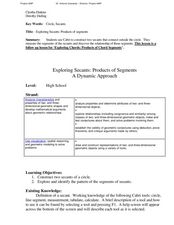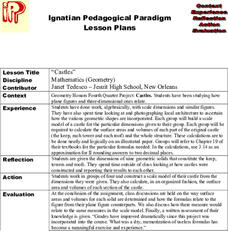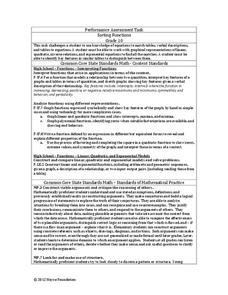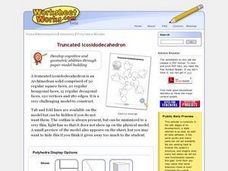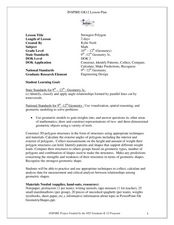Curated OER
Snowflake Detectives: What Crystal Shape Can Tell Us
Students classify snowflake crystals using geometric descriptors. They hypothesize about the temperatures at which the snowflakes were formed using a temperature/shape chart. They collect and examine snowflakes before drawing and...
Curated OER
Geometry Shapes Playground Safety
Students create a new playground design to present to elementary students during Playground safety week. They review basic geometry to use in observing and recording the equipment on a local playground. They research playground safety...
Curated OER
Exploring Secants: Products of Segments
Students explore secants and circles. In this geometry lesson, students identify the properties of two and three dimensional shapes. They create arguments to prove the theorems are true.
Curated OER
Are you in Golden Shape
Learners solve and verify the solution for unknown measures. In this geometry lesson, students identify the properties of circles. They use the arc, angle and segment relationship to find the missing measures.
Curated OER
Geometry Scavenger Hunt
Students use the digital camera, identify geometric shapes (in nature as well as man-made), and gain a better understanding of geometric vocabulary. They search for and recognize geometric shapes in unusual settings
Curated OER
Castles
Young scholars create a scale model to a castle using the dimensions they were given. They calculate the surface areas and volumes of each section of their castle.
Curated OER
Basic Right Triangles
Elementary schoolers examine the attributes of triangles. In this triangle instructional activity, learners compare regular triangles and right triangles. They explore vertices and angles and investigate obtuse and acute angles. Pupils...
Inside Mathematics
Sorting Functions
Graph A goes with equation C, but table B. The short assessment task requires class members to match graphs with their corresponding tables, equations, and verbalized rules. Pupils then provide explanations on the process they used to...
Curated OER
Truncated Dodecahedron
In this math worksheet, students build a truncated dodecahedron. This is a solid shape with 12 regular decagonal faces and 20 equilateral triangular faces. Students build this shape to assist in developing their cognitive and geometric...
Inside Mathematics
Graphs (2006)
When told to describe a line, do your pupils list its color, length, and which side is high or low? Use a learning exercise that engages scholars to properly label line graphs. It then requests two applied reasoning answers.
Inside Mathematics
Snakes
Get a line on the snakes. The assessment task requires the class to determine the species of unknown snakes based upon collected data. Individuals analyze two scatter plots and determine the most likely species for five...
Curated OER
Dodecahedron
In this dodecahedron worksheet, students build a model of a dodecahedron. The pattern for this shape is made up of twelve pentagons. This is a worksheet generator, and the teacher can choose if a sample of the completed shape will be...
Curated OER
Truncated Icosidodecahedron
In this math worksheet, students use a paper model to build a truncated icosidodecahedron. The worksheet includes a model that is to be cut out and put together by the student. There is an option to include a small preview of the...
Curated OER
Truncated Icosahedron
For this math worksheet, students build a model of a truncated icosahedron. This shape has 12 regular pentagonal faces and 20 regular hexagonal faces. An option to include a preview of the finished model is included for the teacher.
Inside Mathematics
Population
Population density, it is not all that it is plotted to be. Pupils analyze a scatter plot of population versus area for some of the states in the US. The class members respond to eight questions about the graph, specific points and...
Curated OER
What's The Idea?
Sixth graders explore line segments, rays, parallel, perpendicular and intersecting lines. The teacher discusses, with the class, real life items that represent each geometric idea studied. They use cotton balls, strings and popsicle...
Curated OER
Calculate It
Fourth graders find the area and perimeters of squares and rectangles using a calculator to check their multiplication. They use the appropriate formulas to find the area and perimeter of the given geometric shapes.
Curated OER
The Trapping of Trapezoids
This is a nice hands-on activity where young geometers create trapezoids and calculate their area by looking at areas of quadrilaterals and triangles.
Alabama Learning Exchange
Pennies, Pennies and More Pennies
Learners determine the number of pennies needed to fill a room. For this pennies lesson plan, students work in groups to determine the number of pennies needed to fill a room. They compute the probability of the head of a pin...
Curated OER
Strongest Polygon
Students define and identify shapes by name. In this geometry lesson, students construct, identify and compare polygons based on the number of sides. They classify each shape based on their angle sum theorem.
Curated OER
Incredible Edible Bridges
Students create a bridge using engineering and geometric concepts. In this geometry lesson, students identify the missing measures of polygons sides and angles. They work together to solve real life situation using problem solving...
Curated OER
Let's Tesselate
Students investigate the geometrical concepts of translation, reflection, and rotation. They make different observations looking for the concepts that are displayed in classroom items like floor tiles, carpet designs, and visuals hung in...
Curated OER
Technology Integrated Lesson
Students investigate symmetry in the real world. In this geometry instructional activity, students inter-relate math and technology. They create and name a variety of polygons.
Curated OER
Pyramids & Prisms: Guler's Formula
Sixth graders compare and contrast two-dimensional shapes to three-dimensional shapes. After watching a demonstration, they make their own shapes using nets printed on paper. To end the lesson, they use the shapes they made and...




